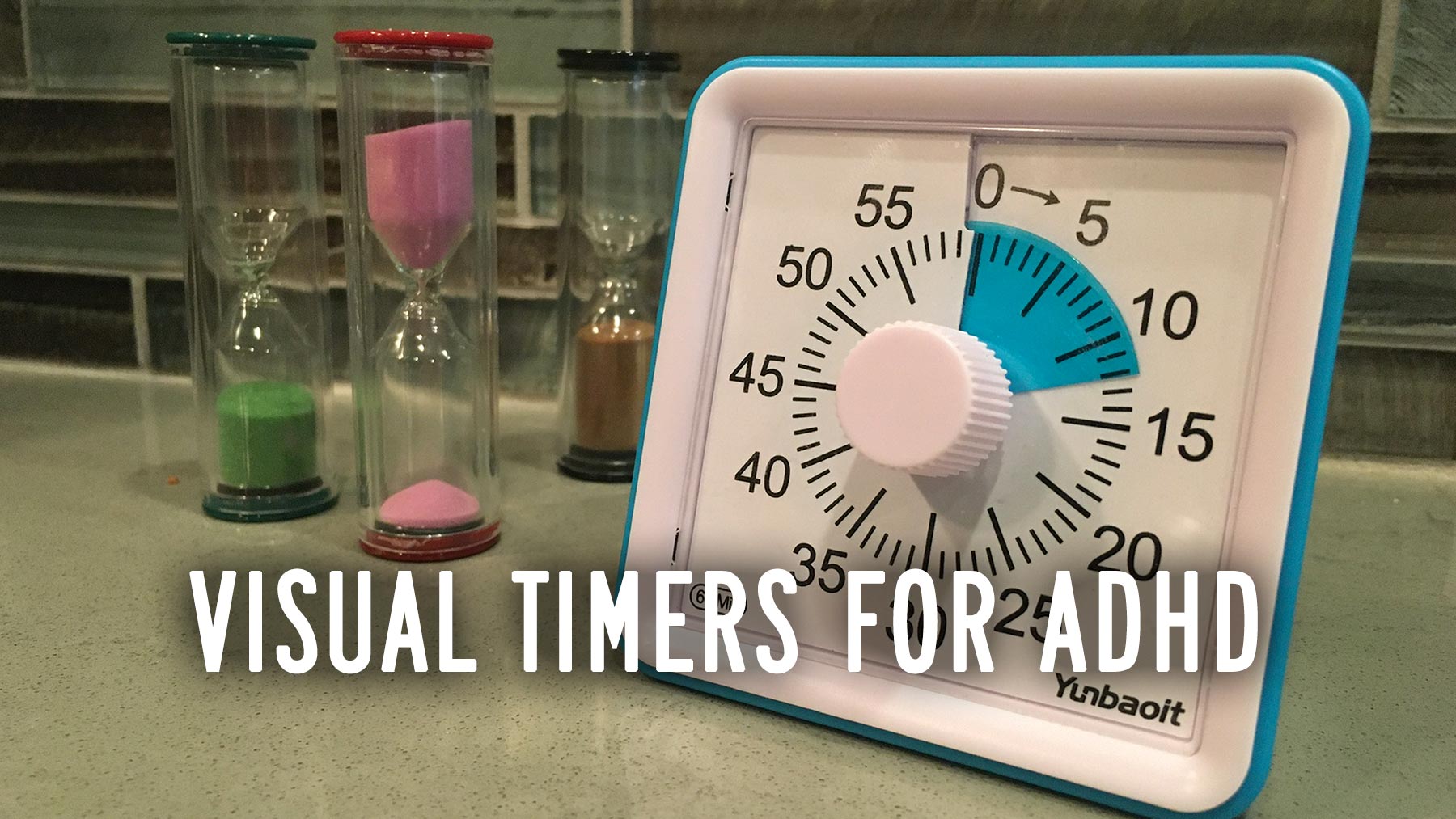Visual timers for ADHD
These homeschool years are giving us a wonderful opportunity to develop ADHD-related skills, like time management. Tools like visual timers are an ideal way to build time awareness.

One of the most misunderstood aspects of ADHD is how it impacts attention. Folks with ADHD have powerful attention abilities—it's the ability to direct that attention that can be hampered. Enter one of ADHD's biggest upsides, the power of hyperfocus: the ability to attend to something completely, deeply, for extended periods of time.
These periods of intense focus allow amazing things to happen. Some of the world's most clever and productive inventors, creators, and researchers have ADHD.
Hyperfocus does come with a downside. That time spent in hyperfocus can lead to other, important aspects of life being neglected. Also, someone can come out of their hyperfocus not feeling good about how that time was spent. They often have no awareness of how much time has passed.
Folks with ADHD need external tools and systems to replicate what neurotypical people have automatically, and take for granted. In the long run, Wanda will figure out what tools and systems help her manage her hyperfocus. No one can figure that out for her, because what works for each person is sometimes wildly different. What I can do is to introduce her to some options, and help her learn how to notice what's working.
It's a marathon, not a sprint. She's going to need tools and systems to help her manage her ADHD for the rest of her life. It's critically important that she feels good about her tools and systems.
It's not uncommon for ADHD folks to develop some deeply uncomfortable feelings around clocks, calendars, schedules, and timers. They're a physical manifestation of the expectations of a world that expects their brains to work differently than they do. They're often the first visual cue that they've done something "wrong"*: missed a meeting, forgot to pay a bill, are running late—again. This can develop into a situation where the very tools that could be their most powerful allies feel like enemies.
As much as possible, I'm trying to foster a positive feeling about time-centered tools. If they become associated with punishment or a feeling of brokenness, I'm not just shooting myself in the foot, I'm shooting her in the foot. That means not pushing them as a requirement, and never, ever chastising around them. They're her tools, not mine. They exist only for her to develop a better understanding of how she's using her time.
Our most useful tool is a visual timer, a simple dial timer that shows the time remaining with a band of translucent color. It has a 60 minute maximum, but she typically sets it in chunks of 15 minutes. It gives six bright beeps when the time is up.
I introduced the visual timer to her when she was 6, in the context of time spent playing a computer game. I explained that computer games can be so interesting and so fun, that sometimes people can lose track of time playing them. A way we can prevent that is to check in with ourselves every so often, to think for a bit about how much time we've spent, and think about whether there's something else we should be doing instead.
Switching from something really engaging to something really uninteresting is a skill she's going to need a lot of time to develop, years and years, and she'll always struggle with it. And that's okay. This bears (constant) repeating: It's a marathon, not a sprint. She has been able to develop the skill of keeping track of her time by using her timer. She self-regulates her computer game time to about one hour chunks. She's an absolute boss about wrapping up her screen time! She makes it look easy.
If there's an instance where I think using the timer could help, rather than get it out myself, I'll usually engage in a bit of problem solving with Wanda, asking some Socratic questions that lead her to chew on the problem, and perhaps decide on her own that the timer is a tool she wants to use. Her ownership of the solution is critical. That includes my supporting her if her solution is something else entirely. She needs the room to experiment. Her ability to try out solutions that don't work while I'm still at her side to support her is gold, far more valuable than if I teed up everything for her. The best solutions she'll come up with are things I won't think of.
Other simple timers worth considering:
- The time-honored (ha! sorry) hourglass. Little ones get tipped over too easy, though, and big ones are, well, bulky. Plus it's hard to gauge how much time is left. And it's easy to miss when the time is up. We have them and used them when Wanda was little, but rarely do these days.
- Insight Timer. This is a meditation app on Wanda's iPad. It has tons of options for gentle, ambient sound effects or music to play while the timer is running, and further options for pleasant "time's up" signals. It's great if you want something soothing. Wanda particularly likes to use this timer when she's writing.
- Cube timers. I haven't seen these in person yet, so we haven't used them, but I'm intrigued. They're six-sided cubes, and each side is marked with a different time increment. You set it by rotating the cube to the side with the time you want. Tools are only any good if you'll actually use them, and the super-simple nature of this cube gives it some potential power. I might get one for those times when something in the oven needs just one or two more minutes.
* If you have ADHD (or pretty much any neurodiversity for that matter), you're not "wrong" when time gets goobered for you. Your brain isn't wired that way. Evolution has produced neurodiversity because our species is more successful with that diversity. Your different brain has value to all of us, it makes us all collectively better. If we'd shift how society handles these things to better honor and accommodate that, it'd sure be cooler.

